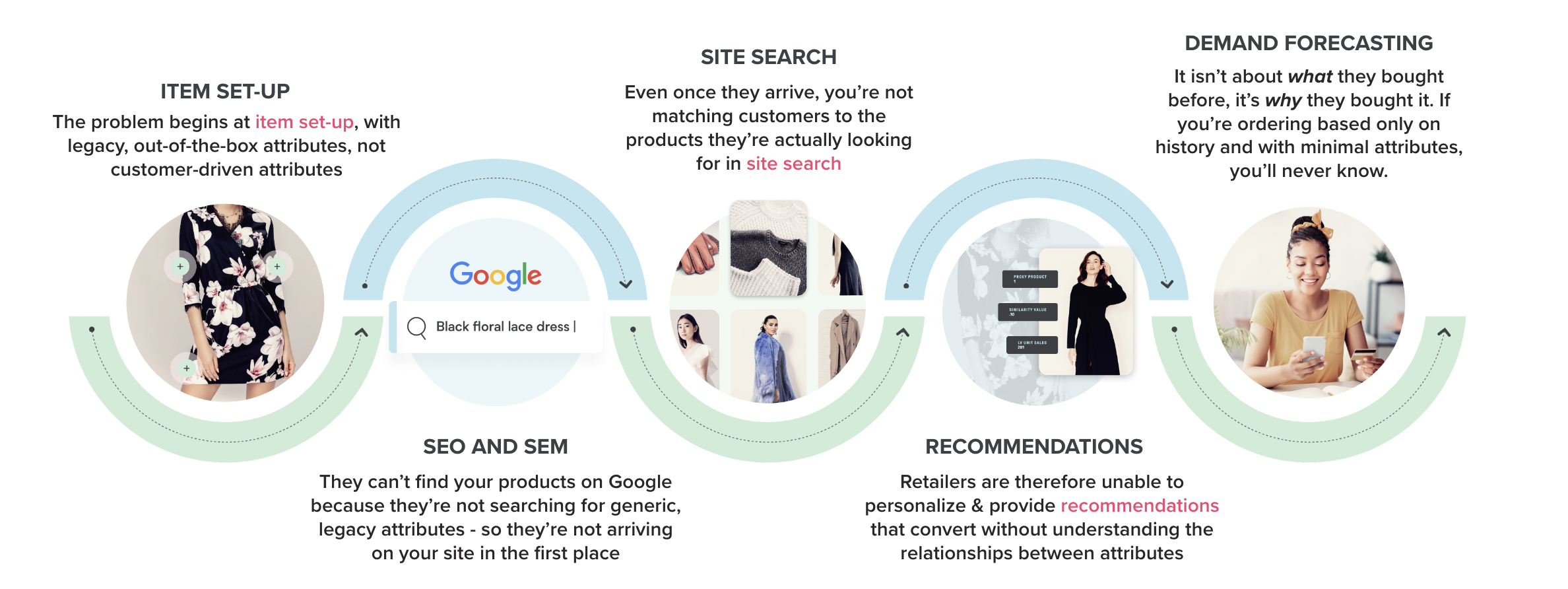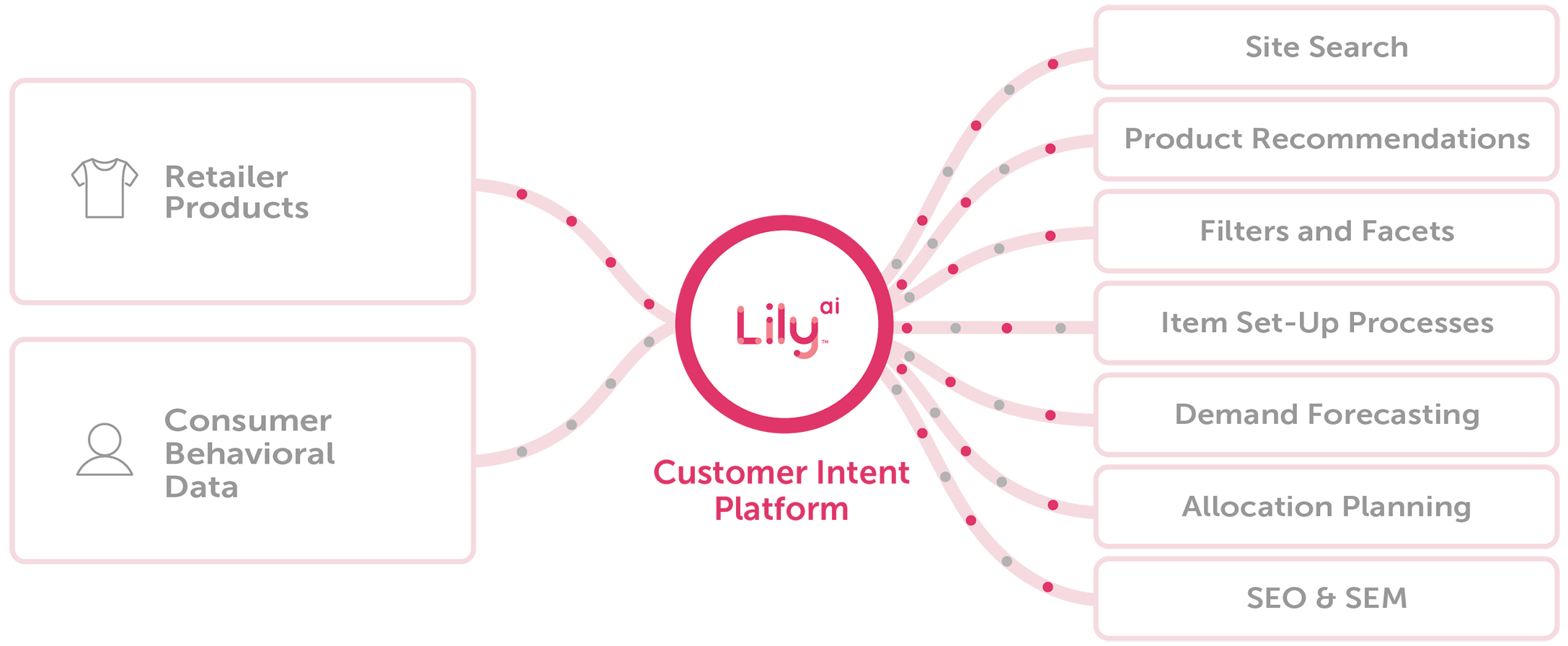Why We Invested

As investors, it’s not every day that we are presented with an idea with the potential to disrupt and innovate a large and expanding global market, let alone by a team with the ability to pull it off. This was the case with Purva Gupta and Sowmiya Narayanan’s ambition for Lily Ai and their mission to optimize the eCommerce tech stack.
Fernbrook (Fund II) recently participated in the $25 million Series B round of Lily Ai, along with Canaan Ventures and Conductive Ventures. In this article, we will discuss our rationale for making this follow-on investment.
Company Overview
Based in Mountain View, CA, Lily Ai provides eCommerce companies with AI/ML software products designed to power webstore components like search engines and product discovery carousels.
Lily Ai was founded by Purva Gupta (Eko India & Unicef) and Sowmiya Narayanan (Texas Instruments, Yahoo, Box). We were impressed by their vision to develop AI/ML software and tools that accurately connect a retailer’s or brand’s shoppers to products they are searching to buy.
Lily Ai’s algorithms help its customers dramatically improve on-site search, deliver personalized product discovery, recommendations, and demand prediction. Its solutions drive revenue growth, higher conversion rates, and increased consumer loyalty for its customers. We first met Lily Ai in 2017, and in 2018, our Fund I led the Company’s 2018 Series A bridge round with participation from NEA, the Series Seed lead investor.
Defining Artificial Intelligence (AI) | Machine Learning (ML)
The concept of artificial intelligence can be disconcerting to some and might even conjure up visions of alarming science-fiction outcomes.
AI/ML algorithms take large data sets, process them, and apply what’s discovered in ways that provide better and better outcomes with each iteration. The term AI is typically applied to computer programming that can solve problems and make decisions based on programmed rules. AI uses programmed math and logic to make possible conclusions on processed data and compare the results to arrive at an optimal decision.
ML is more narrowly defined as the function that follows algorithms and statistical models to process and organize data and enhance the accuracy of conclusions drawn from it. The ML function proceeds without direct human intervention in the context of AI programming.
As an algorithm is trained by the digestion of more and more data sets, AI performs in an increasingly sophisticated way, and that can be useful in everything from online search and recommendations to pricing optimization to self-driving cars.
The Problem: Existing Ecommerce Tech Stacks Don’t Understand Customer Intent
Ecommerce companies and their customers now operate in a hyper-personalized world in which shoppers expect to be shown what they want online before they even know they want it.
The COVID-19 pandemic increased and sharpened consumers’ expectations.
- According to McKinsey & Co., spending in online channels continued to climb, post-pandemic – YoY growth in eCommerce was 27% at the end of Q1 2022; the total uplift in eCommerce penetration, from the onset of COVID-19 until March 2022, was 33%.
- McKinsey also notes that 71% of consumers expect that eCommerce will deliver personalized interactions, while at least 76% get frustrated when this personalization isn’t delivered.
Coming out of the pandemic, eCommerce platforms that previously embraced digital optimization are now standing head and shoulders above their peers. Likewise, greater demand has widened any hairline fractures in the customer experience when shopping online into broader fissures – any minor hurdle to purchasing is now enough to make consumers shop elsewhere.

What Ecommerce is Missing
While abandoned cart emails and light personalization are now table stakes, many ecommerce platforms are still failing to properly engage their customers, deliver personalized product recommendations based on search patterns, and get them to the checkout. The industry average conversion rate is 2%, with a 50% return rate and an average unsold inventory of 30%. With a reliance on outdated spreadsheet-based demand forecasting, eCommerce operators can only guess about their customers’ true search intent and relevant inventory to recommend to them.
The Solution
Lily Ai has tackled these problems head-on bringing together an understanding of product attributes and customer intent. Its Customer Intent Platform turns qualitative product attributes into a high-volume, universal mathematical language with unprecedented accuracy.

Lily Ai’s solutions are powered by a universal language that can help present every unique consumer with exactly what they’re looking for in real time. This universal language, which Lily Ai pioneered and developed, has yet more fluency: it can also help contextualize and understand why a customer likes or dislikes a product, and thus improve recommendations.
- It injects robust product attribute data and unique Customer Intent into the entire eCommerce tech stack, massively enhancing performance by providing a depth and scale of product attribution that no other enterprise solution can match.
- Its proprietary algorithms put an end to the fragmented tech stacks common in eCommerce, and instead, Lily Ai offers a hyper-personalized experience for both eCommerce platforms and customers.
- Instead of rudimentary text-based keyword search, Lily Ai’s customer intent platform uses AI-powered image recognition to extract product attributes, allowing retailers ten times greater attributes per product – and in turn, greater accuracy.
- Because Lily Ai has pioneered and automated this universal language to describe products, it is also in a unique position to understand consumers in this same language of attributes, to extract the why behind what they like and dislike in a completely unique way that’s never been done before by AI.
Why This Matters
Lily Ai has already helped Bloomingdale’s create a universal product description language that is consistent across its entire organization.
- By automating the product data attribution process, Lily Ai helped improve Bloomingdale’s conversion rate – 43% of shoppers use the search bar, but Bloomingdale’s could only reliably sort category and brand searches. With deeper, richer, and crucially, AI-powered product attribution, Lily Ai finds that customers spend 2.6 times more.
Why We Invested?
Since Fernbrook’s founding in 2017, one of our key investment themes is that any company that generates revenue from its own eCommerce channel will need to continue investing in enterprise “consumer enablement” technologies that drive conversion, sell-through, customer loyalty, and overall eCommerce engagement.
Because of our deep industry operating and investing experience, we understand what eCommerce players are focused on investing in and what is missing in their tech stack. We identified Lily Ai as a key solution provider in optimizing the consumer’s eCommerce experience. We also saw that Lily Ai had the opportunity to continue expanding its total addressable market by entering multiple consumer product sectors in multiple countries and markets.
Additionally, we underwrote an accomplished management team. Purva and Sowmiya have the requisite consumer and technology backgrounds and have built a strong team across all functional areas to scale the company.
We only invest where we identify a significant opportunity to add value to a management team. Since we made our first investment in 2018, the Fernbrook team continues to make business development introductions to senior executives in the eCommerce, consumer brand and retail world and across multiple product categories (apparel, beauty, home, etc.) and geographies.
Fernbrook is a proud partner of the Lily Ai team.
Thank you to Daniela Morosini for her assistance with this article.
Sources
- McKinsey & Co., May 4, 2022, How US consumers are feeling, shopping, and spending – and what it means for companies.
November 16, 2022
Share this Article
